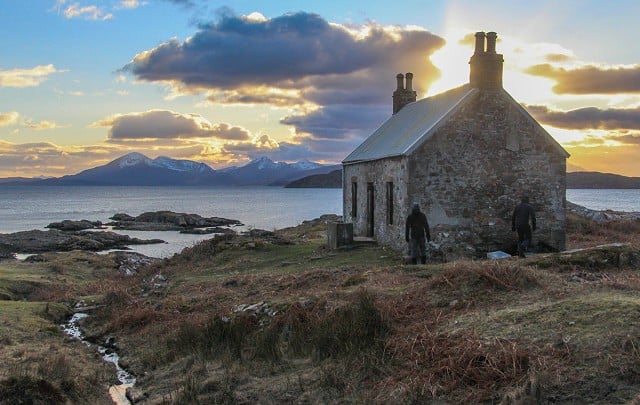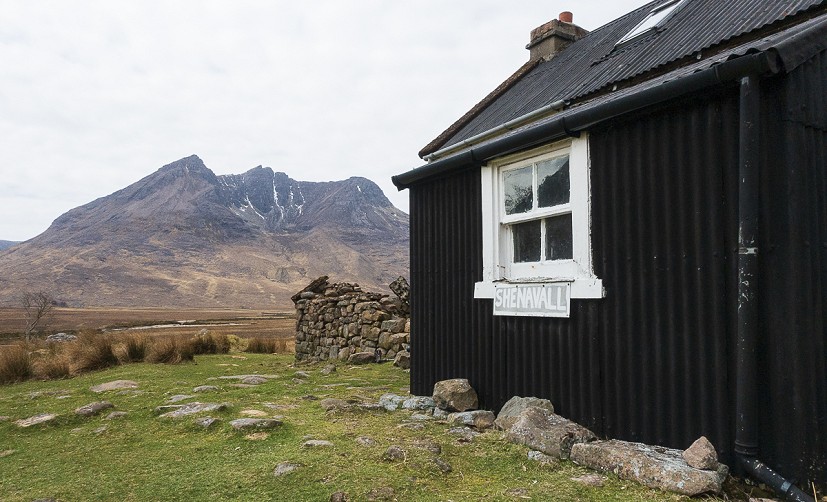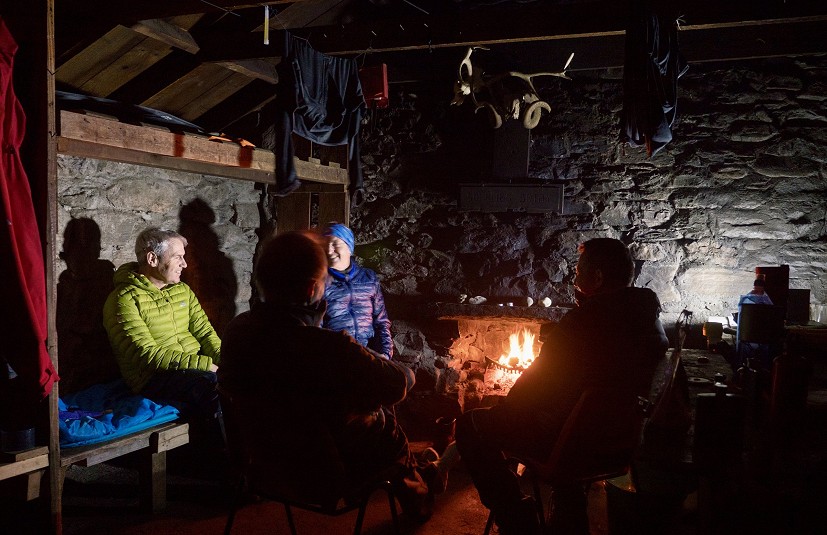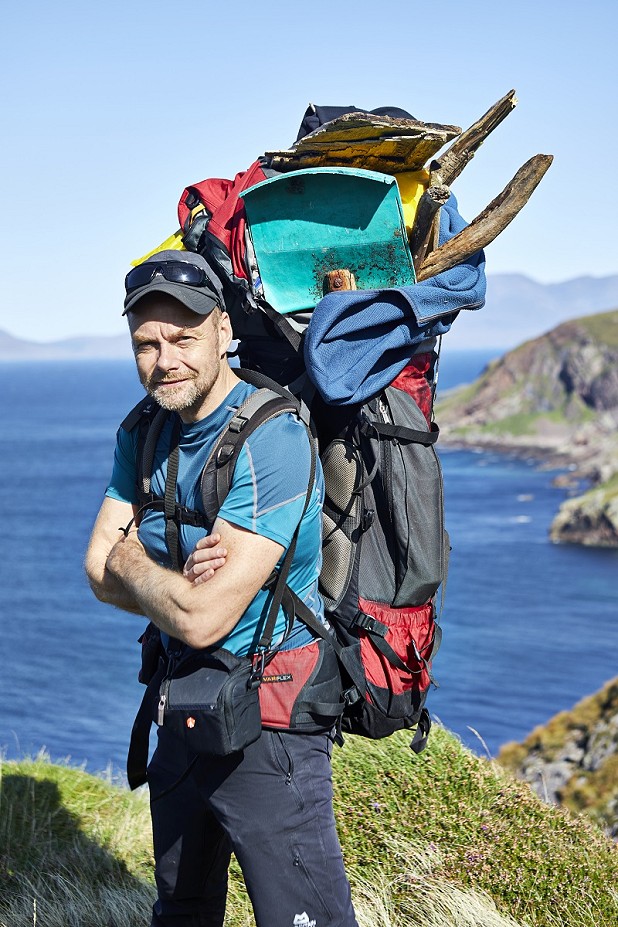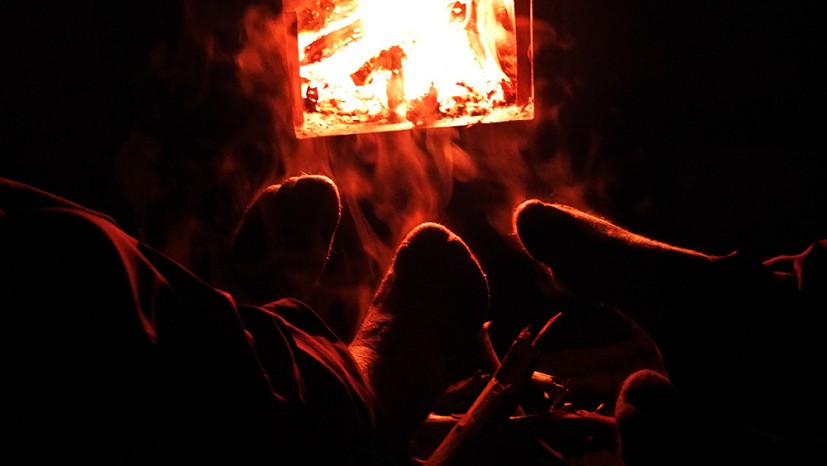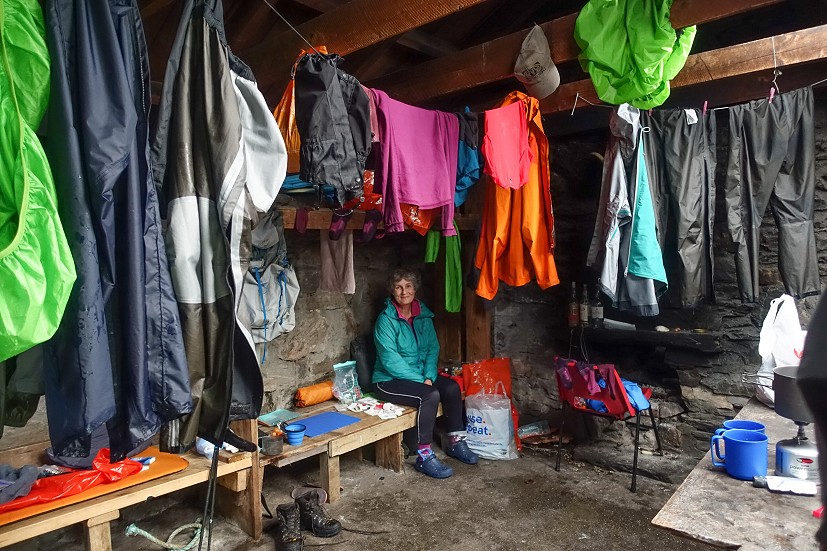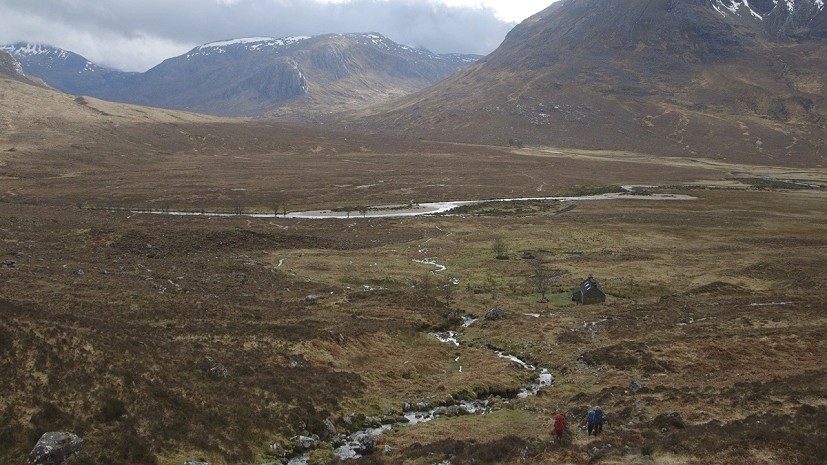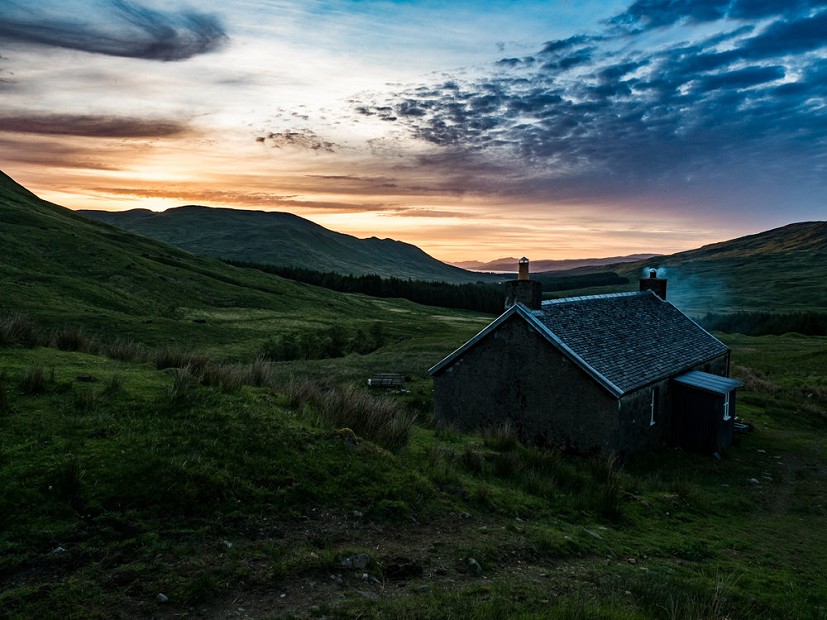Bothy Beginner? Here are the Do's and Don'ts
More storm-proof and midge-resistant than a tent, cheaper than a hostel (they're free!), and loads more fun than a stuffy hotel, bothies can make for some memorable nights out in the hills. Perhaps you're keen to give bothying a go, but not sure where to start? Here's a handy guide, complete with tips from a couple of seasoned bothy experts.
Pick an easy one to get started
Not all bothies are hidden away hours from a road. If you're new to this game, and want something relatively amenable for your first night way, then look at the more accessible options:
"Bothying can be an immensely rewarding experience, and you don't have to strike out to the farthest corners of the Highlands to have an adventure that will live long in the memory. Many of Scotland's top bothies are easily accessible for the first timer, and armed with some basic knowledge and foresight, plus a positive, open attitude, you can share the warmth of gently radiating stove, snuggle up tight on a raised sleeping platform, and wake up to views not matched by even the most expensive hotels" writes Geoff Allan, author of The Scottish Bothy Bible and Scottish Bothy Walks.
- For more from Geoff see geoff-allan.co.uk
Bothies are free
There's no need for money, or a membership card. The ethos of bothies is refreshingly egalitarian: they're available for anyone. You don't have to belong to anything more specific than the community of hill-goers.
But they are all owned by someone
Like every last scrap of land in Britain, each bothy is privately owned. In Scotland they'll usually belong to a big estate, generally one that's devoted to the strange industry of shooting animals for fun. Visitors are usually welcomed, or at least tolerated, but there may be times when a given bothy is in use by the estate for deer stalking activities, and closed to the public. While the Mountain Bothies Association (MBA), a charity, maintain a large number of bothies, they do so thanks to the goodwill of the actual owners. This arrangement can be called off at any time, and occasionally a bothy will be removed from public use, for instance if it has been misused. Don't give the owners any good cause to want to do that!
Need info on a bothy? Check out the MBA website
Once a closely guarded secret divulged only to a select and beardy few, these days the location of all MBA-maintained bothies is open knowledge, with information freely available on the MBA website - see bothy map. Of course there are others elsewhere, not maintained by the MBA. But you'll have to find out about them for yourself.
Always carry a tent or bivvy
Your intended home for the night might already be full to capacity, or beyond. Perhaps the other occupants will be loud and obnoxious, and you'll end up preferring your own company out of doors (it happens). Or maybe you'll have a disaster of a walk-in. If you fail to locate your bothy at all it'll be a long way back to the car at 10pm in a hail storm. Go equipped to survive a night without a roof. Hopefully it'll never be that dramatic, but it's best to give yourself options.
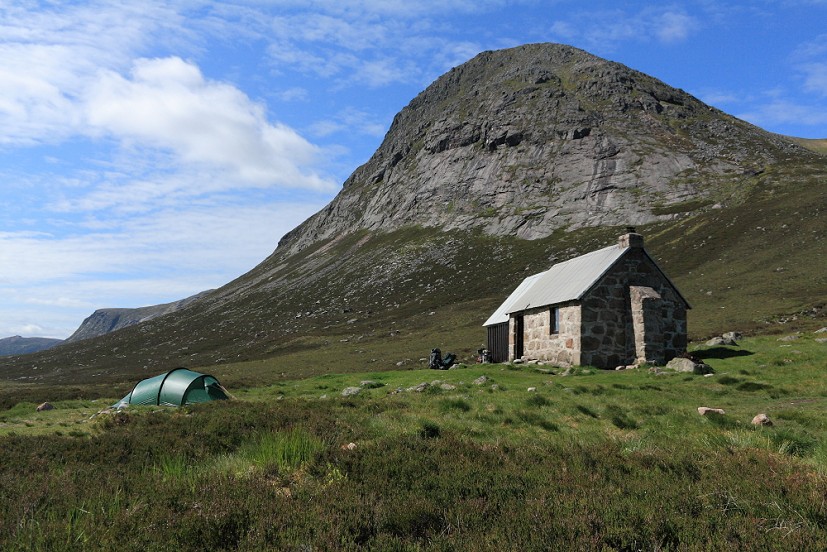
Treat it as indoor camping
Facilities are going to be at best spartan, and sometimes that means not much more than four roughly wind-tight walls and a dry-ish floor. Any bedding found in-situ is liable to be festering, so bring a camping mat and a sleeping bag of your own. Don't assume you'll be able to cook on the bothy fire: A camping stove and cookware are essential.
Bring fuel for the fire
A fire adds much-needed warmth, and a focal point for your evening. Watching the dancing flames sure beats box sets on Netflix. But such is the deforested state of our hills that you cannot rely on finding dry firewood in the vicinity of many bothies. Bear in mind the cumulative impact of hundreds of bothy-goers on what few trees there may be, too. Gather with care and only take fallen wood.
For guaranteed warmth and cheer then you will usually need to carry sufficient fuel with you to feed the stove or fireplace all night. Wood is a bit of a non-starter in terms of bulk on your back, so for all its nasty climate impact, smokeless coal is probably your best bet. Sadly, there just isn't an environmentally friendly way to torch stuff. Given the smoky fug that develops in a typical bothy, you're not going to be doing your lungs many favours either. Consider it an occasional treat! Bear in mind that some bothies have no stove or fireplace, so to save wasted weight on the walk-in do your research in advance.
"Even after more than thirty years spent exploring Scotland's nooks and crannies, I still feel a child-like thrill when I see a bothy in the distance, knowing that I have a secure sanctuary for the night" says Geoff Allan.
"I get a real buzz from making the place a home from home, carrying extra supplies of food, and making sure I have fuel for a fire. Like many bothy regulars, I'm verging on the obsessive when it comes to providing high quality bothy TV, especially once the nights begin drawing in. Sometimes I carry in coal, but I may also look for fallen branches or dead wood which can accumulate on river meanders after heavy rainfall. If I've landed at an island bothy, I take particular delight combing a beach for even the most spindly pieces of driftwood; a bag full of kindling and the odd log can be enough to supply warmth for a long autumn evening. And if I stumble across a storm beach, well its like winning the lottery."
"In a few far flung places to the north and west, (plus some of the island bothies), bags of peat have been left for use, and some estates do leave supplies of firewood in a simple act of generosity. But don't rely on it! The vast majority of bothies have a saw or axe to cut wood down to size, and it's good bothy etiquette to leave wood for the next visitor."
"The absolute sacrosanct rule is never cut live wood. This not only damages trees, but green wood just does not burn. There are also restrictions around a couple of Cairngorm bothies (Ruigh Aiteachain comes to mind) where you are asked not to collect fallen wood to protect the natural habitat. Here wood is supplied by the Glen Feshie Estate pretty much year round."
"Most of the time I've been pretty proficient at stocking up for the evening, though I have had the odd harebrained moment. Attempting to pull a 25kg bag of lignite into a bothy on a kid's sledge one particularly Baltic winter's night ended quickly when my fellow reprobate and I ground to a halt 500 yards from the car. The snow cover was far too patchy to get up any momentum, and after a lot of swearing we reluctantly stashed away most of the supply, decanting a few measly coals to our already heavy-laden sacks - which we obviously then had to lug in three back-breaking miles to the bothy!"
But don't torch the place - or yourself, says John Burns
The hills far above the bothy were draped white as the moonlight tiptoed along the high ridges. In the foot of the dark glen Charlie and I sat in the old bothy and warmed ourselves beside its great iron stove. The windows of the simple stone shelter were etched white with frost and even the cheerful burn a few yards from the door was stilled and ice choked.
Charlie and I squandered our youth together in the mountains and crags of our Highland home. We talked long into the night about the foolishness of young men and how little we both had learned. We conversed and shared a glass so long that the candles dwindled and we began to feel of tendrils of cold sneaking under the bothy door. We had committed the greatest sin of bothy life.
We had allowed the fire to go out.
"I'll fetch some fire lighters," Charlie said, heading for the store cupboard.
I had a better idea. "We're almost out of fire lighters. Let's soak some paper in paraffin."
Charlie thought for a moment, "Will it no flash?"
I have more experience than Charlie in using combustible liquids. "No, I'll have to light it."
I lite a long taper and Charlie returned from the store with a paper towel dripping paraffin and hurled it into the stove, onto the smouldering embers of the fire.
"See, I was right," the paraffin had not flashed but sat steaming as I reached into the stove with the burning taper.
There was a vivid flash and an angry giant picked me up and tossed me across the room. This was followed by a bone jarring thud as my shoulder crashed into the wood cladding of the bothy wall. I slumped to the floor in a daze, and was instantly coated in dust and dead spiders falling from the ceiling above. Across the room a furious dragon of Aegon was doing its best to cremate the bothy.
Charlie leapt up and slammed the stove door shut and caged the dragon which roared in its iron cell. Then he ran across the room and hit me on the shoulder so hard it knocked the breath out of me.
"What the hell are you doing?" I coughed.
"You're fleece is on fire," Charlie yelled and he hit me again, even harder.
Five minutes later, fleece extinguished and dragon tamed, we sat contemplating the events of the last few minutes.
"You better have a dram," Charlie passed me a glass of amber fire, in his trembling soot blackened hand.
I took the glass and sipped the warming fluid as the room slowly came back into focus, "What did you do?"
- John Burns is a mountaineer, storyteller and writer - see johndburns.com
Carry plenty of spare clothes
In a tent the occupants soon warm the air, but a damp stone cottage on the side of a hill is never going to be exactly snug. There's no central heating - obviously - and while you might get a decent blaze in the grate to banish the chills for a few hours, the draughty corners are unlikely to stay warm for long. Sitting around for hours in the gloom is a sure way to feel the cold, and in autumn or winter you'll want a decent duvet jacket.
"If you are staying overnight in a bothy its noticeable how cold you can get as you are pottering about, even if you've made yourself a hot drink" says Geoff Allan.
"I make a point of changing into dry clothes as soon as I arrive, and have found it significantly helps to warm myself up. Being damp and cold in your sleeping bag should be avoided if at all possible. I bag my sleeping gear separate to everything else to ensure it stays dry."
Don't forget toilet roll, a trowel and hand sanitiser
Bringing everything you need with you includes all the necessaries for al fresco pooing. While many bothies come equipped with a spade for turd disposal, carry a folding trowel (designed for the jobbie) in case there isn't one. There'll never be a ready supply of paper, so ensure you have sufficient for your needs. Go at least 30m (preferably further) from the bothy, nowhere near burns or streams, and definitely not uphill of the bothy water source. Cut out a small square of turf, dig a decent hole, do what you came for, and bury the evidence, replacing the turf on top. Carefully burn used paper, or better yet pack it out in a dog poo bag.
Keep group numbers small
The key attraction of bothies is that they are a great leveller, open to everyone. But if you and ten mates take up noisy residence you'll be effectively annexing the place for your private group, and potentially making it much less welcoming to anyone else who shows up. With space at a premium inside and toilet facilities generally limited to digging a hole in the ground outside, large groups can also have a big impact on the surroundings. Go lightly. The MBA's bothy code states that groups should be limited to fewer than six.
Store food out of rodent range
There's bound to be a resident population of mice, sustaining themselves on the crumbs left by passing walkers, and the occasional boot. If you don't want your breakfast bagels to come pre-nibbled then bag everything up and hang it on a convenient nail.
Candles add both light and cheer
In a remote bothy, pretty much the definition of off-grid, long dark nights are going to seem longer and darker still. You could illuminate the place with torches and camping lanterns, but think of the batteries. A handful of candles or tea lights are well worth their weight, adding a cosy ambience as well as shedding much needed light. Try not to burn the place down, of course; and remember to bring a couple of torches too, since a candle isn't much use on a night-time toilet trip in the wind. Any candles you don't get through can be left for the next occupants.
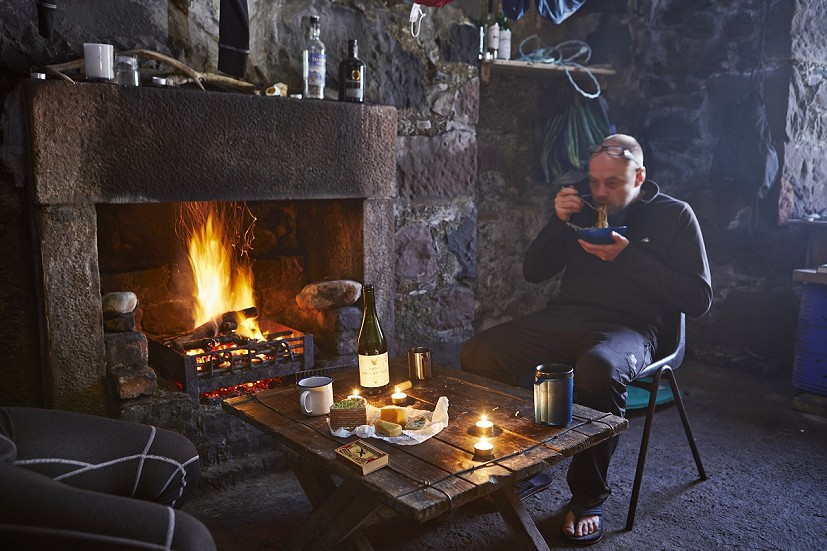
Enjoy yourself - but not too much
Bothy nights are all about friendly conversation, trading banter by the fire with companions new and old. Lubrication is a natural part of the culture, and it's nice to share your tipple around. Bearing in mind the walk-in, a higher alcohol percentage is good for the strength:weight ratio, but do try to hold back on the sheer volume. Getting so pissed and rowdy that you keep other bothy users up all night is really not cool. Everything in moderation!
Try not to get freaked out
It's spooky at night, alone in the pitch dark, in a cold, draughty hovel miles from human habitation. There will be noises. No bothy night is without its mysterious creaking, that alarming scuttling in the corner, or the occasional unaccountable bang to wake you in a cold sweat. Even the most level-headed sceptic could be forgiven for letting the imagination run away with them. Just remind yourself it's only the mice. Probably.
Pack out all your rubbish and perishables
Perhaps it's stating the obvious to implore people to take all their rubbish home with them, but the mess in which bothies are sometimes left suggests that some still need to learn basic responsibility. As well as all food waste, packaging, tins and jars, any empty bottles should also be removed. There's no refuse collecting service here: If you don't do it, someone else will have to. It may be nice to leave unopened tins of food or beer, but anything that rodents might get at should be removed. Ideally you'll manage to clear up in-situ rubbish, too, to leave the bothy in a better state than you found it. Don't forget to sweep and tidy before you leave.
Follow the bothy code
From group size and rubbish, to fires, toileting and litter, it's worth familiarising yourself with the MBA's code of conduct - see here.
Watch the water levels, advises John Burns
One of the great joys of being in a bothy in bad weather is sitting watching the storm outside while you are comfortable and dry.
All day great black clouds rolled across the glen and dumped oceans of water onto the corrugated iron roof of the bothy. This was a long time ago when the youth hostel in Glen Affric would be abandoned by its warden at the end of the summer and remain open as an unmanned bothy throughout the winter. Six of us from the local mountaineering club had somehow obtained a key to the forestry road and been able to drive to within a few miles of the hostel.
We had spent the night of the storm entertaining each other with stories and poems. Big Davie recited Robert Service's poem about the shooting of Dan McGrew while his diminutive wife Pat followed him with a couple of songs. Young Martin read to us from a dog eared copy of Patey's One Man's Mountains. All this with copious amounts of tea and biscuits around the hostel dinning table.
By morning the foul weather had passed over and we enjoyed a leisurely breakfast, our only aim being to take the short walk to our cars and drive to the pub in Cannich for a couple of pints on the way home. We slowly packed our gear and Davie, always impatient to get going, left first with his rucksack slung over his shoulder.
The rest of us were still packing when Davie returned after only a few moments, his shoulders hunched with concern. "The path's gone."
We rushed outside and instantly realised why he was worried. The path that we had casually followed had sunk well below the level of the loch. In fact the whole floor of the glen was flooded. It was impossible to get back to our cars so we did the only thing we could and waited.
After three hours the flood had reduced somewhat and we all agreed that we would attempt to get out. We followed the path until it vanished into the water and then waded in after it. At first the after came only up to my knees. Like the rest of the group I felt for the submerged path with a stick. It was slow going and our feet were wet but we were getting out and the mood of the party lifted.
Then it happened. I stepped into a bottomless hollow. Later everyone agreed that I sunk completely from view. The only debate was for how long and how deep. I didn't care, I was soaked to the skin. Wet and bedraggled I eventually made it to the parked cars. There I put on the only dry clothing I had, a pair of World War II vintage long John's complete with trap door. Pat managed to find me one of her pink pullovers which was several sizes too small. It was dry and there was nothing else, so I was glad of it.
Later, standing beside the fire of the Glen Affric hotel, I startled the waitress with my unusual attire.
"He sank in the Loch," Davie explained, trying reassure her.
The young woman handed us two pints of heavy and examined me suspiciously, "Aye, are you sure he didn't drown?"
If in doubt, do go out
"Bothies are a haven in bad weather" says Geoff Allan. "As long as you are careful about your choice when it comes to river crossings, and have fuel for a fire, you will have an experience to remember. Scotland in all its atmospheric force is quite something to behold, and, unless you are extremely unlucky, the weather will improve eventually. The cycle of depressions is generally interspersed with ridges of high pressure, even if it is only for a few hours..."


